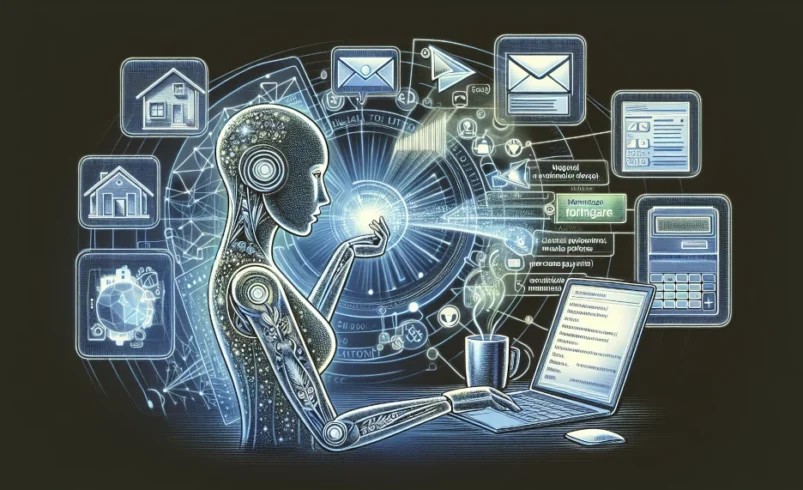The Best AI Agents for Enterprises by Industry (Finance, Retail, Healthcare)

Artificial Intelligence (AI) has evolved from a futuristic concept to a powerful, transformative tool for businesses across industries. For enterprises, AI agents are no longer just a passing trend; they’re essential for driving efficiency, cutting costs, and improving decision-making. As industries like finance, retail, healthcare, and manufacturing embrace AI, the potential for growth and innovation has never been greater.
AI for enterprises is reshaping the way businesses operate. From automating repetitive tasks and analyzing vast amounts of data to providing actionable insights, AI is revolutionizing how companies run their operations. Whether it’s enhancing customer service in retail or managing risk in finance, AI is making its presence felt across sectors.
In this blog, we will explore the best AI agents for different industries and how they’re helping enterprises stay competitive in an ever-evolving market.
What Are AI Agents?
AI agents are systems powered by artificial intelligence that autonomously perform tasks or provide services. These agents often use technologies like machine learning, natural language processing, and decision-making algorithms to execute functions without constant human input.
From automating back-office operations to directly engaging customers, AI agents offer scalable solutions for enterprises in any industry. For companies seeking to improve productivity and operational efficiency, AI agents are no longer optional; they are critical to modern business strategies.
AI Agents in Finance: Revolutionizing Data-Driven Decisions
The finance industry deals with vast amounts of data daily, and AI has become essential in processing and analyzing that data. From managing risk to detecting fraud, AI agents help financial institutions stay competitive while ensuring compliance with stringent regulations.
- AI for Risk Management
AI agents in finance can analyze historical data and predict potential risks, enabling companies to implement preventive measures. AI systems like predictive analytics platforms can identify early warning signs of financial instability or default risks, empowering businesses to take proactive steps.
- Fraud Detection
Fraud prevention is another area where AI agents shine. By continuously monitoring transactions in real time, AI agents can flag suspicious activities with a level of accuracy that far exceeds human capability. This reduces the chances of fraudulent transactions slipping through the cracks and helps institutions comply with anti-money laundering (AML) regulations.
- Automated Trading
AI agents are also transforming the world of trading. By analyzing market trends, financial news, and historical data, AI-powered trading systems can execute trades autonomously, capitalizing on opportunities that human traders might miss. This leads to faster and more accurate decision-making in volatile markets.
Key AI Solutions for Finance:
- Chatbots for Customer Service: Providing instant responses to customer queries related to balances, transfers, and loan inquiries.
- Fraud Detection Systems: Leveraging machine learning algorithms to identify suspicious activities.
- Algorithmic Trading: Enhancing trading efficiency by executing trades based on real-time data analysis.
AI Agents in Retail: Enhancing Customer Experience and Supply Chain
Retail businesses are increasingly adopting AI for enterprises to improve operational efficiency, boost sales, and enhance the customer experience. With the rise of e-commerce and omnichannel shopping, AI is becoming a pivotal tool for retailers to stay competitive.
- Personalized Shopping Experiences
AI agents can analyze customer data, including browsing history, purchase patterns, and preferences, to offer personalized recommendations. This enables retailers to provide tailored shopping experiences, increasing the likelihood of conversion and customer retention.
For instance, AI-driven recommendation engines on platforms like Amazon and Netflix are designed to suggest products based on past behavior, leading to more sales and higher customer satisfaction.
- Inventory Management and Demand Forecasting
Retailers also rely on AI for inventory management and demand forecasting. AI systems analyze sales patterns and predict which products will be in high demand. This enables retailers to optimize inventory, reduce overstocking, and prevent stockouts.
By predicting future trends, businesses can adapt their supply chain strategies, ensuring that they meet customer demand without incurring unnecessary costs.
- Chatbots and Virtual Assistants
Another area where AI is making waves in retail is customer service. AI chatbots and virtual assistants can answer customer inquiries 24/7, providing instant support. Whether it’s helping customers with returns or guiding them through the purchase process, AI agents ensure a seamless shopping experience.
Key AI Solutions for Retail:
- Personalized Recommendation Engines: Providing tailored suggestions to customers based on their preferences.
- Inventory Management Systems: AI-driven platforms that forecast demand and optimize stock levels.
- Virtual Shopping Assistants: AI bots that assist customers with product recommendations, order tracking, and customer support.
AI Agents in Healthcare: Improving Patient Care and Operational Efficiency
In healthcare, the potential of AI for enterprises is immense. From improving patient care to streamlining administrative tasks, AI agents are revolutionizing the way healthcare providers operate.
- AI for Diagnostics
AI is playing a crucial role in diagnosing diseases and conditions. AI algorithms can analyze medical images (like X-rays and MRIs) to detect abnormalities that may not be easily visible to the human eye.
Additionally, AI-driven diagnostic tools are being developed to assist in detecting diseases such as cancer, heart disease, and neurological disorders, ensuring early intervention and better treatment outcomes.
- Patient Care and Assistance
AI-powered virtual assistants are increasingly used in healthcare to provide personalized patient care. These AI agents can monitor patients’ vital signs, remind them about medications, and track their health progress. They can also answer health-related questions and provide emotional support, ensuring patients receive consistent care outside of the hospital setting.
- Operational Efficiency
In addition to improving patient care, AI is enhancing the operational side of healthcare. AI systems can automate administrative tasks such as billing, scheduling, and patient record management, allowing healthcare providers to focus more on patient care and less on paperwork.
Key AI Solutions for Healthcare:
- AI-driven Diagnostics: Analyzing medical images and data to assist in diagnosing conditions.
- Virtual Health Assistants: Monitoring patient health and providing care reminders.
- Automated Administrative Tasks: AI systems that handle appointment scheduling, patient records, and billing processes.
AI Agents in Manufacturing: Streamlining Production and Maintenance
In manufacturing, AI for enterprises is driving significant advancements in automation, predictive maintenance, and supply chain optimization. Manufacturers are leveraging AI agents to improve productivity and reduce costs.
- Predictive Maintenance
AI agents are being used in manufacturing to predict when machines will need maintenance, thus preventing costly downtimes. By analyzing data from equipment sensors, AI systems can identify signs of wear and tear, prompting maintenance before a machine breaks down. This not only reduces repair costs but also improves the longevity of machinery.
- Supply Chain Optimization
AI helps manufacturers streamline their supply chains by analyzing patterns and predicting future demand. This enables businesses to optimize their production schedules, reducing waste and ensuring that they meet customer demand efficiently.
- Robotic Process Automation (RPA)
In manufacturing, AI-driven robotics are automating repetitive tasks, improving production speed and consistency. These robots can carry out tasks such as assembly, inspection, and packaging, ensuring higher accuracy and reduced errors in the production process.
Key AI Solutions for Manufacturing:
- Predictive Maintenance Systems: Monitoring equipment health to schedule timely maintenance.
- Robotics and Automation: AI-powered robots that perform repetitive tasks in the production process.
- Supply Chain Management: AI platforms that optimize inventory and production schedules.
Final Thoughts
AI for enterprises is no longer optional; it’s essential. Industries like finance, retail, healthcare, manufacturing, and logistics are turning to AI agents to boost efficiency, cut costs, and improve customer satisfaction. From automating simple tasks to supporting complex decision-making, AI is transforming business operations.
By choosing the right AI solutions for their needs, companies can stay competitive and adapt to a rapidly changing digital world. As technology evolves, AI will play a key role in helping businesses grow and succeed in the future.



